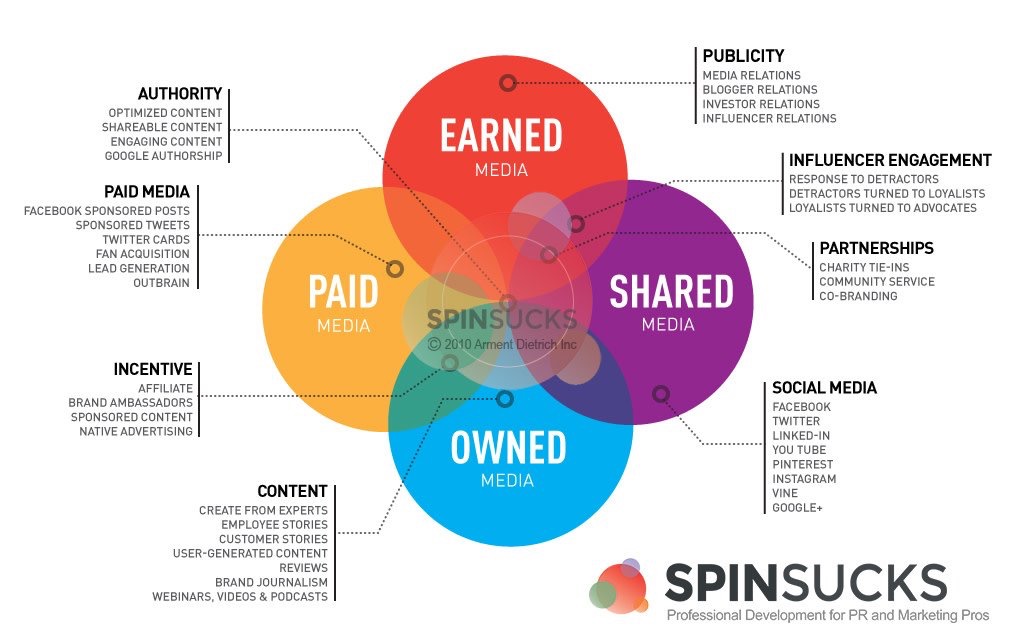We end our journey into the PESO model by talking about the final piece: owned media.
Before we get into it, let’s do a quick review of this integrated marketing communication model.
The first week we talked about paid media which is essentially digital advertising. We then talked about earned media, the act of placing content with media outlets. Last week we talked about shared media, better known to most people as social media, and how it can amplify your content.

This week we are going to talk about the importance of owned media and how it fits into the marketing funnel.
What is Owned Media?
The term, owned media, can lead to a misconception. Many people think that anything they have created and shared is owned media.
A video is posted on YouTube. You share a picture that you took on Instagram. Some comments on the state of marketing are posted to Facebook. You pin grandma’s recipe to Pinterest. That’s all owned media, right? Wrong.
Owned media means that you own the content and the channel and that channel is almost always a website. While you may have created the content that you share on social media, you don’t own the means of distribution, aka the channel. Therefore it’s not owned media.
However, if you share the video, the picture, the recipe, a post on marketing on your website it is owned media. In this case, you own the content and the channel. It seems like a small difference but it’s significant.
Do you Own or Rent?
Facebook, Twitter, Instagram, YouTube and platforms like them are rented land. We can use them, but they aren’t ours and they can make changes anytime they wish.
If Facebook decides to tweak its algorithm next week, it could potentially have a major impact on your content being found. Sound far-fetched? It has happened before and it will happen again.
When Facebook changed its algorithm to favor friends over everything else, there was a big impact on those who had put all their eggs in the Facebook basket. Some even went out of business and all because of a simple algorithm change.
At the end of the day, all the social media platforms are businesses. Like you, they are going to do what’s best for their business. This may or may not coincide with what’s best for yours. Avoid the conflict and treat the social media platforms for what they are: a space you rent.
Get to the Bottom
Owned media may be at the end of the acronym but it arguably it has the most impact.
This is not to say that it’s more important than the other pieces of PESO. Each piece is important and has its own role to play but owned media is where
Let’s take a step back. A couple of months ago I wrote about the marketing funnel. I defined it as having six stages:
- Awareness
- Interest
- Consideration
- Conversion
- Customer Relationship/Retention
- Evangelism
For the sake of this discussion, we are going to focus on the first four and leave customer relationship/retention and evangelism to other articles.
Paid, earned, and shared media work at the top of the funnel. They create awareness and interest. This is important work. If people aren’t aware, you will never have the chance to convert them at the bottom of the funnel.
The goal of any organization is a conversion or desired action. It could be a sale, a donation, or getting an email address.
Information about your organization, product or service is on your website. Yes, you can share this information in other ways but the website is where there will and should be greater detail. It’s where you have information that drives people from interest to consideration and then conversion.
Beware of the Online Brochure
The biggest mistake I see with websites (including my own at times) is that they aren’t set up with the customer in mind (I’m using the term customer in a very broad sense). We set them up for us and what we get in the end is an online brochure, or “brochureware”.
While it may look great, if it’s not helpful to the customer they won’t stay long. This is a problem because the longer someone stays on your site, the greater chance you have to turn them into a customer.
Take a look at your Google Analytics. O
Owned Media Content
The next question is
It depends on what type of content is most important to your audience. If you don’t know stop and listen. What are they asking you when you talk to them, when you survey
Determining how that content is delivered is the next challenge. It could be in pictures, writing, video or a combination of some or all of these. The subject will most likely guide you.
Final Thoughts
In a world where everybody is on social media, owned media can be sometimes be overlooked. Do so at your own risk.
Owned media has a unique function amongst the other pieces of the PESO model. It’s the only channel in which you have complete control.
This means you have the power to create an experience that is customer-focused. It is only then that you will be able to use it to turn leads into customers.
- Is Your Marketing Connected? - March 6, 2025
- Stop Planning and Start Strategizing - October 24, 2024
- The Importance of Creating a Connection With Your Marketing - June 6, 2024

